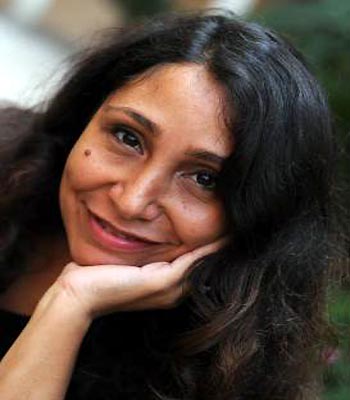The film’s most poignant moment appears when Wadjda spots a bicycle on the back of a pickup truck in a Riyadh street. This is the moment that changes her life. The dream of buying a bike to race her friend, Abdullah, becomes her most important goal, and hence she tries to get hold of the money via whatever means she can. Through a web of small and interwoven stories, we learn that Wadjda is the only child of a young couple who have to live apart for most of the month to earn their living.
Wadjda is very proud of being a girl. When examining an illustration of her family tree in her living room, she notices that all the names are male, no female name is listed, and so she scribbles her name on a piece of paper and pins it onto the board next to her father’s. However, when she finds the piece of paper discarded the next day, it only adds to her disappointment.
Yet the dream of the bicycle is what keeps Wadjda going throughout, and for this reason she enrolls in a Qur’an recital competition, hoping to win the first prize, which eventually she does. When asked by the headmistress what she intends to spend the money on, she replies, with a gleam in her eye, “I want to buy a bicycle”, only to be reprimanded by the strict, scowling headmistress for being “corrupt”.
Filmed in Riyadh, al-Mansour the director sees “Wadjda” as an indication of the changing attitudes to cinema in the Kingdom. Al-Mansour, who was thrilled by the reception the film has received in London, appeared after the screening to answer questions and happily accepted the applause and appreciation of the audience.
Asharq Al-Awsat met with al-Mansour prior to the screening to talk about the future of Saudi filmmaking, the experience of filming in the Kingdom, and the process of finding the right cast. The task of finding Saudi actresses proved especially difficult. Al-Mansour revealed that “this is quite a challenge. It is not difficult to find Saudi actors who send me messages and pictures on Twitter, but it is a different case for actresses.” She pointed out that the casting of Reem Abdullah (who played Wadjda’s mother) was possible because Reem is a well-known TV actress, but the greater problem lay with finding the right child to play Wadjda. She explained: “Until the final week before filming we were still looking for the right girl, and when Waed Muhammad came along I knew instantly that she was what I needed. There she was, wearing those trendy clothes and big headphones, the right candidate, she was amazing”.

This image released by the TriBeca Film Festival shows a scene from “Wadjda”, a film shot in Saudi Arabia, and the first Saudi film made by a female director. Source: AP Photo/TriBeca Film Festival
Another aspect of filming on the streets also proved difficult, especially for the German crew who worked on the production, namely the weather conditions. Al-Mansour explained: “We would be expecting sunny weather and suddenly we got a sandstorm or heavy rain. I guess it was difficult for them.”
Asked if she was forced to change anything in her script, al-Mansour insists that she was not censored in any way. She said: “I grew up in Saudi Arabia and I want to work from within [the country], I don’t want to be someone who makes films from abroad. That’s why I was very careful to present a moderate voice while writing the script. I wanted to say that, while we can discuss our cultural issues, we need to be proud of what we are and try to deal with our problems”.
Cinema, for al-Mansour, plays an important role in bridging the gaps between different cultures. She underlined that “a lot of people don’t know Saudi Arabia, they know the stereotype but they don’t know how we live on a daily basis. “Wadjda” presents a slice of daily life. I wanted the film to be about the people, not about the issues. I do hope that cinema develops in Saudi Arabia, we are an important country politically and economically and I hope that the arts become just as important.”
“Wadjda” revolves around women and their issues in the Kingdom, but the film’s director says that she wants to do more than that. Al-Mansour explained: “I don’t want my films to be only about women, but I understand why I talk about them a lot. I grew up in a small town in Saudi Arabia, that is my world and I wanted to talk about the reality that I live in and know well.”
Despite the fact that the film will not be shown on the big screen in Saudi Arabia as there are no cinemas there, it will be shown on television soon. In this regard, al-Mansour commented: “It’s sad that people won’t be able to see it there, but those who can will be able to see it in cinemas in Bahrain and other Gulf countries, and for the rest it will be shown on the Rotana channel soon. I have to say that there has been a big change in Saudi Arabia. After all, I filmed there with official permission and I do hope we’ll open cinemas there soon.”
Haifaa al-Mansour now carries the title “the first Saudi director of a feature film” quite happily. She says “it’s a cool title, I can live with that”.

